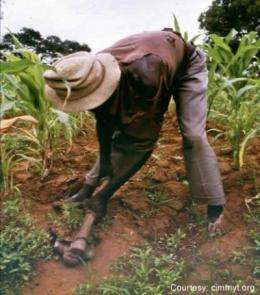Discovery offers hope of saving sub-Saharan crops from devastating parasites

Each year, thousands of acres of crops are planted throughout Africa, Asia and Australia only to be laid to waste by a parasitic plant called Striga, also known as witchweed. It is one of the largest challenges to food security in Africa, and a team of scientists led by researchers from the University of Toronto have discovered chemicals and genes that may break Striga's stranglehold.
When crops grow, their roots release a plant hormone called strigolactone. If the soil contains Striga seed, it will use the released strigolactone as a cue to germinate and infect the crop plants. Once connected to the crop, the Striga plant kills the crop by sucking out its nutrients.
"In sub-Saharan Africa alone, Striga has infected up to two-thirds of the arable land," says U of T cell and systems biologist Peter McCourt, principle investigator of a study published this week in Nature Chemical Biology. "With chemicals and genes in hand that influence strigolactone production in plants, we should be able to manipulate the level of this compound by chemical application or plant breeding which would break the Striga-crop interaction.
The scientists used a model genetic plant system called Arabidopsis to screen 10,000 compounds and identify a set of five chemicals, designated cotylimides, which increase the accumulation of strigolactone in plants. They also found related chemicals that decrease strigolactone levels. From there, they screened for mutants of Arabidopsis that were resistant to cotylimides and identified mutants that made less strigolactone. These mutants identified genes that regulate strigolactone levels in plants.
Provided by University of Toronto


















